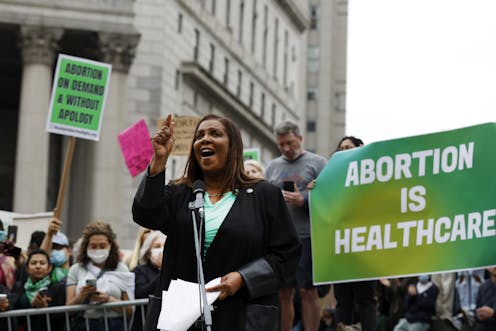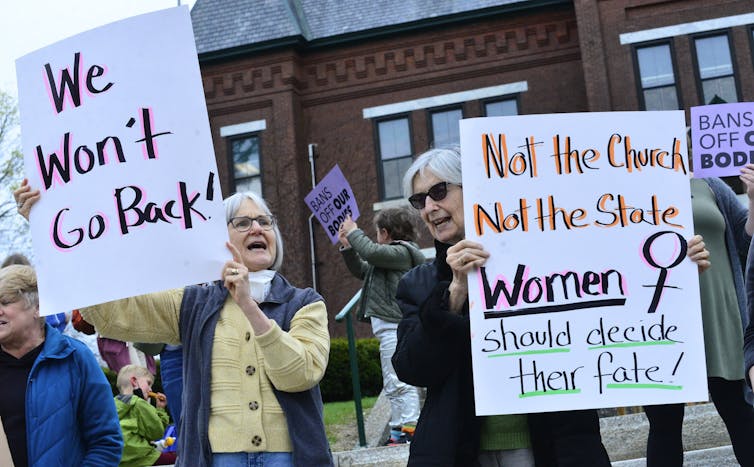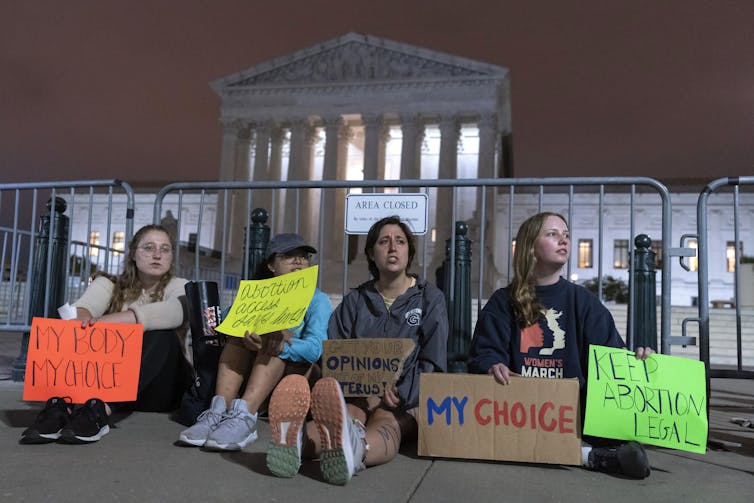
A leaked United States Supreme Court draft opinion reveals it is poised to strike down Roe v. Wade, the landmark 1973 decision that guaranteed abortion as a constitutional right.
The end of Roe v. Wade would dramatically impact reproductive rights in the US. It would also likely have symbolic consequences globally, shaping the strategies and tactics of the trans-national anti-abortion movement.
Overturning Roe v. Wade would put the US Supreme Court out of step with public sentiment.
Abortion is a routine and safe health-care procedure accessed by approximately one in four American women. 2021 polling indicated 80% of Americans support abortion in all or most cases, and at least 60% support Roe v Wade.
If Roe v. Wade falls, abortion will be returned to the states for regulation.
About half the states are expected to immediately ban abortion; 16 states plus the District of Columbia have laws protecting abortion rights.
In the short term, a patient’s ability to legally access abortion would effectively be a lottery, determined by geography or having the financial resources to travel significant distances.
In the longer term, opponents of abortion view this moment as a beginning rather than an end. Republican lawmakers are already strategising about legislation that would ban abortion nationwide after six weeks.

Read more: How the US right-to-life movement is influencing the abortion debate in Australia
So what’s all this mean for Australia?
Although Australia is sometimes described as the 51st US state, when it comes to abortion our politics and laws are extremely different.
The Australian public is strongly pro-choice and has been for decades.
Abortion in Australia is regulated by state and territory legislation and the overall trend in the 21st century has been to enshrine abortion as a legal right. In 2021, South Australia became the last jurisdiction to decriminalise the procedure.
Politically, abortion is the subject of conscience votes. It normally does not function as a partisan issue for the major parties, with the notable exception of the 2020 Queensland election, when the LNP promised a review of the recently passed abortion decriminalisation law while One Nation pledged to roll it back.
When asked about Roe v. Wade issue today, Prime Minister Scott Morrison said, “I’m aware of the reports that are coming out of the United States, but that’s in a different country. In Australia there are no changes to those laws.”
But while legal abortion in Australia seems secure, we are still a long way from treating abortion as the routine health care it is.
Access is a key issue
In most of Australia, patients needing abortion care face significant barriers to access.
With the exception of South Australia and the Northern Territory, most public hospitals do not offer abortion care. Instead, private clinics provide abortion services and patients pay hundreds of dollars out-of-pocket.
Access to abortion services outside major cities is almost non-existent.
Regional patients face immense logistical barriers and travel and procedure costs. The pandemic inadvertently led to the permanent closure of regional abortion clinics in Queensland and New South Wales. Telehealth services for early medication abortion can sometimes help but shouldn’t be the only option.
Broadly, there is a significant shortage of trained surgical abortion providers. Although early medication abortion can be prescribed by GPs, very few are certified to do so. Until COVID, many private regional abortion clinics relied on doctors working on a fly-in-fly-out model.
Reproductive rights advocates have repeatedly called on governments to embed this essential reproductive health care into public health services.
In the 2019 federal election, Labor promised “free abortions” via a major sexual and reproductive health policy but has not revisited this proposal in the current campaign.
American tactics imported to Australia
While Australia does not share the US’ intense partisan politics over abortion, we also do not share the approach of Canada where abortion is normalised as reproductive health care.
There has also been a disturbing domestic trend towards the increasing political stigmatisation of abortion.
The tiny Australian right-to-life movement has direct links with the US movement.
In recent state decriminalisation debates, we witnessed the wholesale incorporation of American rhetoric and tactics into the Australian context.
Anti-abortion activists had an out-sized place in these state debates because of their vocal political and religious allies.
Minor parties such as One Nation now have a “pro-life platform”, while several federal Coalition politicians, including Barnaby Joyce, Alex Antic and Matt Canavan have spoken out against abortion.
Amanda Stoker, the assistant minister for women, recently addressed the annual Queensland anti-choice rally.
The end of Roe v. Wade will likely embolden our own anti-abortion activists and politicians, who can question public provision of abortion, push for additional legal and medical regulations, and seek to revise laws by emphasising US talking points such as “late-term” and “sex-selective” abortions.
Legislatively eroding abortion is a strategy that has proven immensely successful in the US.
It ensures abortion is not viewed as health care, that anti-choice rhetoric is amplified in mainstream media, and that abortion patients and providers are further stigmatised.
Cumulatively, these tactics have a chilling effect that will likely make access to abortion even harder.

If the US Supreme Court overturns Roe v. Wade this year, it will mean the end of a decision that has survived 49 years worth of hostile legal challenges.
It demonstrates the power and danger of long-term tactics relying on stigma and the gradual erosion of rights. It reminds us all that rights must be continually defended, never taken for granted.
Read more: Will Roe v Wade be overturned, and what would this mean? The US abortion debate explained
Prudence Flowers has received funding from the South Australian Department of Human Services. She is a member of the South Australian Abortion Action Coalition.
This article was originally published on The Conversation. Read the original article.







